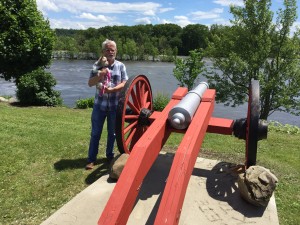Many lovers of American history are well aware that Benedict Arnold was the infamous traitor of the American Revolution. But the fact that he started out as a hero during that same war still astonishes me.
That fact came home to me this past summer when I went on a research trip to Saratoga National Park and visited the battlefield in Stillwater, NY where the conflict took place. The area of the park is enormous and visitors need a vehicle of some sort to traverse the length and breadth of it. Bike riders can manage the trails as well.
One of the more memorable monuments there is the granite piece that is a memorial to Arnold. The caption reads this:
In memory of the most brilliant soldier of the Continental Army who was desperately wounded on this spot, the sally port of Burgoyne’s Great Western Redoubt, 7 October 1777 winning for his countrymen the Decisive Battle of the American Revolution and for himself, the rank of Major General.
It sounds like a marvelous endorsement, erected in 1887 by John Watts de Peyster, Maj Gen SNY, 2nd Vice President Saratoga Monument Association. Marvelous except for one thing not mentioned: The name of the “most brilliant soldier.” Arnold’s name is completely missing from the monument in his honor.
The opposite site of this marker is a boot, to acknowledge the severe injury Arnold received at this battle.
In Richard Ketchum’s book, Saratoga, he describes Arnold’s acts of courage in the midst of the battle:
“Most generals would have been satisfied to drive a defeated enemy from the field of battle, but Arnold had the killer instinct, and as long as those two redoubts stood and the British had a chance of escaping, there was no stopping him. … Charging in the face of heavy musket fire and grapeshot, his troops stormed through the abatis while Arnold, raging like one of the Furies, urged them on, shouting and waving his sword. … Arnold’s charge took the outnumbered Brunswickers completely by surprise. Riding around behind the redoubt, Arnold’s luck ran out. He was shot in his bad leg, his borrowed horse was killed, and the leg was broken when he was pinned to the ground beneath the animal.”
He would have earned a Purple Heart today for such bravery and likely other awards as well. Yet following Arnold through the rest of the War, his pride seemed to become a factor, not to mention his demands for compensation for his war commitment. He is an interesting person to study as it shows someone’s inner motivations leading him down a path of disloyalty and eventually, becoming a turncoat.
By August 3, 1780, General Benedict Arnold was put in charge of the fort at West Point, New York. It was America’s most important fortification at the time. By August 30, 1780, Arnold determined he would betray America and surrender the fort to the British. It was a series of providential discoveries that revealed his plot to destroy the fledgling country of America.
“Pride goes before destruction, a haughty spirit before a fall.” (Proverbs 16:18 NIV)
“Therefore, since we are surrounded by such a great cloud of witnesses, let us throw off everything that hinders and the sin that so easily entangles. And let us run with perseverance the race marked out for us.” Hebrews 21:1 NIV
Saratoga Letters by Elaine Marie Cooper. Purchase it here on Amazon. Also available in kindle


















